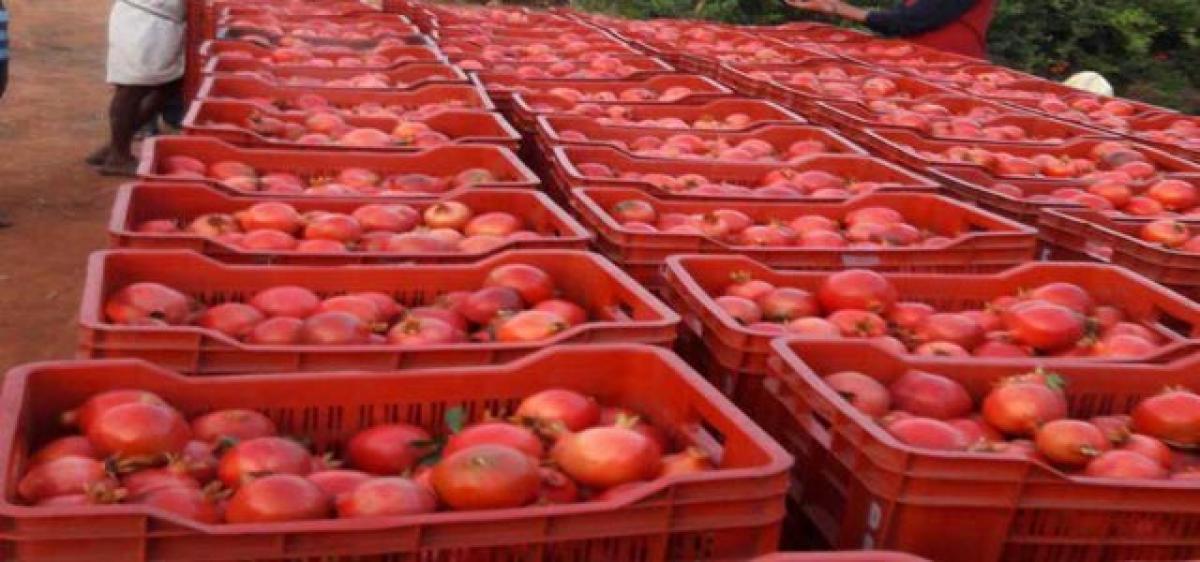Live
- GMR Airports Unveils AI-Powered Digital Twin Platform to Transform Airport Operations
- India poised to become leading maritime player: PM Modi
- Top Causes of Kidney Stones and How to Recognize Silent Symptoms
- India’s renewable energy capacity logs 14.2 pc growth at 213.7 GW
- Winter Session of Odisha Assembly adjourned sine die
- Biden calls Trump's tariff approach 'major mistake'
- After Drama Over Eknath Shinde’s Chief Minister Race, Maharashtra Cabinet Formation Faces New Tensions
- Egyptian FM, Blinken discuss recent developments in Syria
- Iran's supreme leader says Syria's developments result of US-Israeli 'plot'
- Elon Musk to Purchase $100 Million Luxury Mansion Next to Donald Trump's Mar-a-Lago, Report Reveals
Just In

It is another example of the proverbial ‘necessity is the mother of invention.’ An idea successfully implemented by a farmer who was vexed with the continuous attacks of fruit flies and moths is now going to help hundreds of farmers from next year.
POMEGRANATE cultivation
Giddalur: It is another example of the proverbial ‘necessity is the mother of invention.’ An idea successfully implemented by a farmer who was vexed with the continuous attacks of fruit flies and moths is now going to help hundreds of farmers from next year. Meet Dappili Venkatarami Reddy, a young farmer from Giddalur in Prakasam district who found a solution to save Pomegranate plantation from the juice sucking fruit flies and moths.
Maharashtra and Rajasthan are the leading Pomegranate producers and exporters in India with thousands of hectares of plantations while Andhra Pradesh is still growing it at a very less scale on around 2000 hectares. Though the atmosphere condition is reported to be suitable for Pomegranate, farmers have not taken it up because of two insects which are damaging the crop in the already grown plantations.
The Anar Butterfly or fruit borer or Deudorix Isocrates or Chilaka in local slang, creates maximum damage to the Pomegranate fruit in India. It lays eggs at the flowering or fruit setting stage and the larvae develop inside the fruits. They feed on the seeds and come outside by boring a hole through the fruit. Another insect, fruit fly or Dega Eega also damages the fruit by puncturing it and turning the seeds into black color.
These two insects enter the Pomegranate crop at night and damage it in terms of quality and quantity and impact the returns for the farmer by more than 50 per cent. The horticulture department had suggested use of bags to cover individual fruit, which is practically not possible.
Prakasam district is known for its continuous drought conditions and suicides of farmers unable to repay the agriculture loans. As the conventional crops are not yielding much produce and support price, many farmers in the western area of the district started to grow sweet lime, a few years ago. After gaining experience and observing the market, few young farmers chose Pomegranate. Dappili Venkata Ramireddy from Giddalur, who has a Pomegranate plantation at Singarapalli in Bestavaripet mandal is one of them.
Ramireddy planted Pomegranate on five acres about four years ago with an investment of Rs. 8 lakh. After his experience with the two insects in the first crop season, he got an idea to get rid of them completely. Ramireddy said, “We spent Rs. 8 lakh for the plantation to grow into trees. Last year we received the first crop and got return on the investment. But after understanding the damage level of the Dega Eega and Chilaka, we didn’t want to lose a single fruit again. So, we completely covered the plantation with nylon net supported on wooden poles.
This net prevented the bugs and also stopped birds and animals from entering the plantation. We spent about Rs. 50,000 per acre for the net and other material. This has proved to be effective and this year we have earned about Rs. 16 lakhs in return up to now.” The success story of Ramireddy spread to other Pomegranate farmers in the neighborhood and they also paid visits to his farm to know more about it.
They asked the Department of Horticulture to provide the subsidy for the net so that it would not become a financial burden to them. M Hari Prasad, assistant director of horticulture said, “Pomegranate is a sensitive crop. It should be protected from the bugs, birds and animals like monkeys. The idea implemented by Ramireddy has proved to be helpful to the farmers.
We sent proposals to the government to provide these nets to all pomegranate farmers on subsidy so that they could also benefit using them. We are going to provide the nets to the farmers from the next season on 50 percent subsidy.”
By Naresh Nandam

© 2024 Hyderabad Media House Limited/The Hans India. All rights reserved. Powered by hocalwire.com







